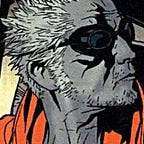micah benedict’s opus
article coming soon but i wanted to preserve this short story i’d written. it’s the seed for something i will be working on
The bookseller had been found dead in his shop after Old Marty had busted in the back way wondering why it wasn’t open. He found the codger slumped over cold tea — from the night before, Old Marty reckoned — with a note written plainly on the tablecloth in front of him. It said:
“I found Micah Benedict’s Opus, after all these years. The book that should not be, still is. And now it’s been stolen from me. You must burn it.”
It’s a curious book. The self-proclaimed monk, of what religion or God he would not say, claimed he had written a book-between-books, a… Novel? that took up residence in the reader’s mind, with no story of its own. Readers would come to remember other books differently.
This parasitic book was intoxicating. A scholar infected by it — and Micah described his work as a pathogen in one of his journals — once successfully defended her thesis arguing that Opus revealed a secret story in seventeen unrelated novellas, published out of order.
How could an author in 1947 know he was writing the introduction to a part 2 that came from 1868? We do not know. What we do know is that the faculty claimed to have memories of this as well. We can assume Opus is transmissible.
What we do know is that before his disgrace and disappearance, the great literary detective whose name has been stricken from our library records, beat Micah to death, according to onlookers, shouting “who told you to write this book? Who did you write it for???”
Micah just laughed.
It was to my surprise, in October 1963, to receive a parcel signed in that familiar scrawl. The letter was, typical for him, terse and to the point. He had, through his formidable powers of literary detection, divined the author of Micah Benedict’s existence. “I was framed.”
(he wrote more here)
“yours in ink and type,” he closed, “eternally p-o’d (pissed offed),” (I closed my eyes at this and held them shut in the hopes that the name would change, but it would not) “Pierce Odd.”
Literary detectives are assigned two things when they take up their post in their respective libraries; a badge, which doubles as their library card, and a gun. They can take their pick. Pierce chose a slab-sided revolver; he preferred intimidation to finesse.
Easy enough to make a scholar anxious. Wave your gun around, they think you’re a thug. Show ’em your library card, now they got questions. Now you’re a librarian with a gun, a literary detective. That carries some weight.
a twitter story i wrote in one draft here april 27, 2022
